
Elizabeth I was Queen of England and Ireland from 17 November 1558 until her death in 1603. Elizabeth was the last monarch of the House of Tudor and is sometimes referred to as the "Virgin Queen".
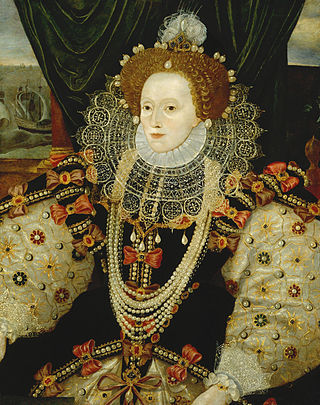
The Elizabethan era is the epoch in the Tudor period of the history of England during the reign of Queen Elizabeth I (1558–1603). Historians often depict it as the golden age in English history. The symbol of Britannia was first used in 1572, and often thereafter, to mark the Elizabethan age as a renaissance that inspired national pride through classical ideals, international expansion, and naval triumph over Spain.
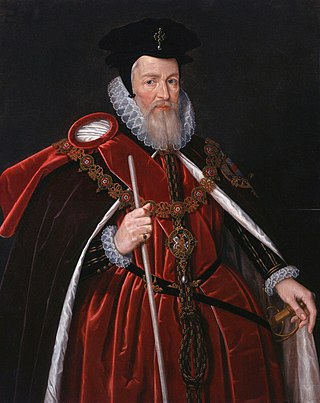
William Cecil, 1st Baron Burghley was an English statesman, the chief adviser of Queen Elizabeth I for most of her reign, twice Secretary of State and Lord High Treasurer from 1572. In his description in the Encyclopædia Britannica Eleventh Edition, A.F. Pollard wrote, "From 1558 for forty years the biography of Cecil is almost indistinguishable from that of Elizabeth and from the history of England."
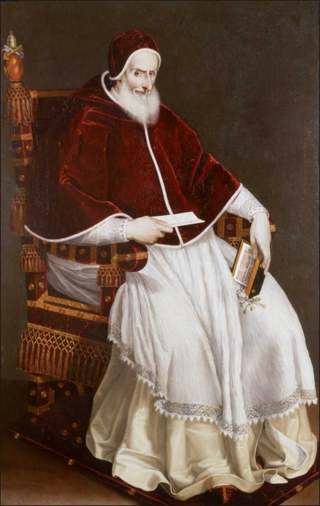
Regnans in Excelsis is a papal bull that Pope Pius V issued on 25 February 1570. It excommunicated Queen Elizabeth I of England, referring to her as "the pretended Queen of England and the servant of crime", declared her a heretic, and released her subjects from allegiance to her, even those who had "sworn oaths to her", and excommunicated any who obeyed her orders: "We charge and command all and singular the nobles, subjects, peoples and others afore said that they do not dare obey her orders, mandates and laws. Those who shall act to the contrary we include in the like sentence of excommunication."

James VI and I was King of Scotland as James VI from 24 July 1567 and King of England and Ireland as James I from the union of the Scottish and English crowns on 24 March 1603 until his death in 1625. Although he long tried to get both countries to adopt a closer political union, the kingdoms of Scotland and England remained individual sovereign states, with their own parliaments, judiciaries, and laws, both ruled by James in personal union.

The Elizabethan Religious Settlement is the name given to the religious and political arrangements made for England during the reign of Elizabeth I (1558–1603). The settlement, implemented from 1559 to 1563, marked the end of the English Reformation. It permanently shaped the Church of England's doctrine and liturgy, laying the foundation for the unique identity of Anglicanism.
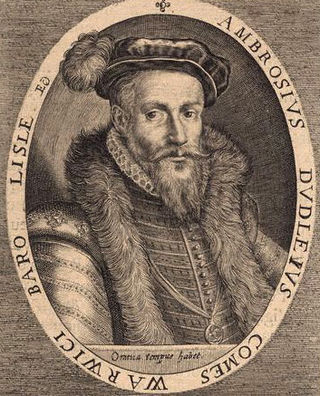
Ambrose Dudley, 3rd Earl of Warwick, KG was an English nobleman and general, and an elder brother of Queen Elizabeth I's favourite, Robert Dudley, Earl of Leicester. Their father was John Dudley, Duke of Northumberland, who led the English government from 1550–1553 under King Edward VI and unsuccessfully tried to establish Lady Jane Grey on the English throne after the King's death in July 1553. For his participation in this venture Ambrose Dudley was imprisoned in the Tower of London and condemned to death. Reprieved, his rehabilitation came after he fought for King Philip in the Battle of St. Quentin.
Early modern Britain is the history of the island of Great Britain roughly corresponding to the 16th, 17th and 18th centuries. Major historical events in early modern British history include numerous wars, especially with France, along with the English Renaissance, the English Reformation and Scottish Reformation, the English Civil War, the Restoration of Charles II, the Glorious Revolution, the Treaty of Union, the Scottish Enlightenment and the formation and the collapse of the First British Empire.

The Anglo-Spanish War (1585–1604) was an intermittent conflict between the Habsburg Kingdom of Spain and the Kingdom of England. It was never formally declared. It began with England's military expedition in 1585 to what was then the Spanish Netherlands under the command of the Earl of Leicester, in support of the Dutch rebellion against Spanish Habsburg rule.
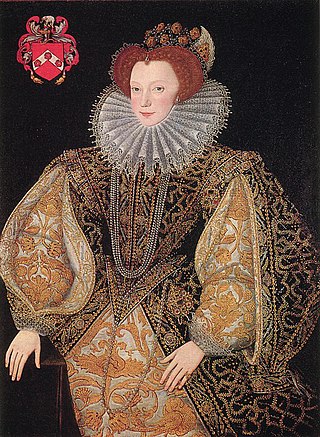
Lettice Knollys, Countess of Essex and Countess of Leicester, was an English noblewoman and mother to the courtiers Robert Devereux, 2nd Earl of Essex, and Lady Penelope Rich. By her second marriage to Elizabeth I's favourite, Robert Dudley, Earl of Leicester, she incurred the Queen's unrelenting displeasure.

In England and Wales, the Tudor period occurred between 1485 and 1603, and included the Elizabethan period during the reign of Elizabeth I (1558–1603). The Tudor period coincides with the dynasty of the House of Tudor in England, which began with the reign of Henry VII. Historian John Guy (1988) argued that "England was economically healthier, more expansive, and more optimistic under the Tudors" than at any time since the Roman occupation.

James FitzGerald, an Irish nobleman, was the successor of Gerald FitzGerald, 14th Earl of Desmond. He assumed the title of Earl of Desmond, which had been suppressed in 1582 after the Desmond Rebellions. He spent much of his life in captivity, and was temporarily, but unsuccessfully, restored to the earldom in 1600–01 by the English in an attempt to pacify Munster during the Nine Years War. He thus became the 1st Earl of Desmond, but soon returned to England, where he died in obscurity.
William Hakewill (1574–1655) was an English legal antiquarian and M.P.

He blew with His winds, and they were scattered is a phrase used in the aftermath of the defeat of the Spanish Armada in 1588, when the Spanish fleet was broken up by a storm, which was also called the Protestant Wind. The phrase seems to have had its origin in an inscription on one of the many commemorative medals struck to celebrate the occasion.
The Tudor Poor Laws were the laws regarding poor relief in the Kingdom of England around the time of the Tudor period (1485–1603). The Tudor Poor Laws ended with the passing of the Elizabethan Poor Law in 1601, two years before the end of the Tudor dynasty, a piece of legislation which codified the previous Tudor legislation.
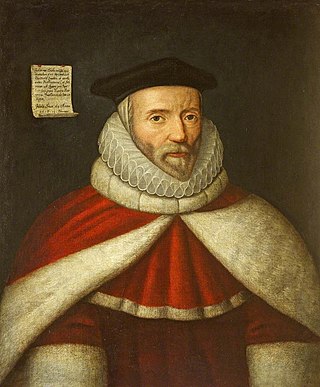
Sir John Croke was an English judge and politician who served as Speaker of the English House of Commons between October and December 1601. He also served as Recorder of London, and won the City of London constituency in his election to the 1601 parliament, being the last Speaker before the death of Elizabeth I, in 1603.

The 8th Parliament of Queen Elizabeth I was summoned by Queen Elizabeth I of England on 4 January 1593 and assembled on 19 February following. Edward Coke, the Solicitor-general and Member of Parliament (MP) for Norfolk, was appointed speaker of the commons. At the state opening of Parliament the Lord Keeper Sir John Puckering informed the house that the reasons for summoning the Parliament were the threat of Spanish invasion and the Queen's "extraordinarye and most excessive expenses". This parliament occurred in the context of an ongoing Spanish-English conflict. At the time parliament was called, the Spanish and English were in the midst of ongoing strife that began decades prior and threatened the prosperity of England. Although relations between Spain and England at the start of Elizabeth’s reign began in a largely cordial manner, the two countries came into conflict over their investments in the Americas along with religious differences; Spain was a Catholic nation while England was a largely Protestant nation. Philip II of Spain was in frequent competition with Elizabeth for influence and resources in the New World and sought to weaken England’s sway in the region. In 1582 Philip began preparing a fleet to invade England, the Spanish Armada. Three years later in 1585, Elizabeth and her government feared Philip’s growing power as his empire came “dangerously near to total supremacy in Western Europe,” which threatened the stability of Elizabeth’s rule. By 1588 the Spanish Armada had been successfully prepared for battle and began an invasion of England led by the duke of Medina Sidonia who sailed with 130 ships carrying 29,453 men in total. Their goal: overthrow Elizabeth. Ultimately, the Spanish Armada failed to defeat the British in battle and take Elizabeth’s crown, but it served as a stark reminder to England that the country was not safe from a Spanish threat. This matter of urgency was a major topic of discussion during the 8th Parliament.

The 9th Parliament of Queen Elizabeth I was summoned by Queen Elizabeth I of England on 23 August 1597 and assembled on 24 October following. The Parliament was summoned to discuss the problems of food shortages and the need for social and economic legislation to deal with the consequential social problems. The speaker was Sir Christopher Yelverton, the Member of Parliament (MP) for Northampton

The 1st Parliament of Queen Elizabeth I was ruled over by Queen Elizabeth I of England on 5 December 1558 and assembled on 23 January 1559. This Parliament would restore many of the laws created by Henry VIII and the English Reformation Parliament. Queen Elizabeth's 1st Parliament passed some 24 public statutes and 17 private measures by the time it was dissolved on 8 May 1559.

The 4th Parliament of Queen Elizabeth I was summoned by Queen Elizabeth I of England on 28 March 1572 and assembled on 8 May 1572.














